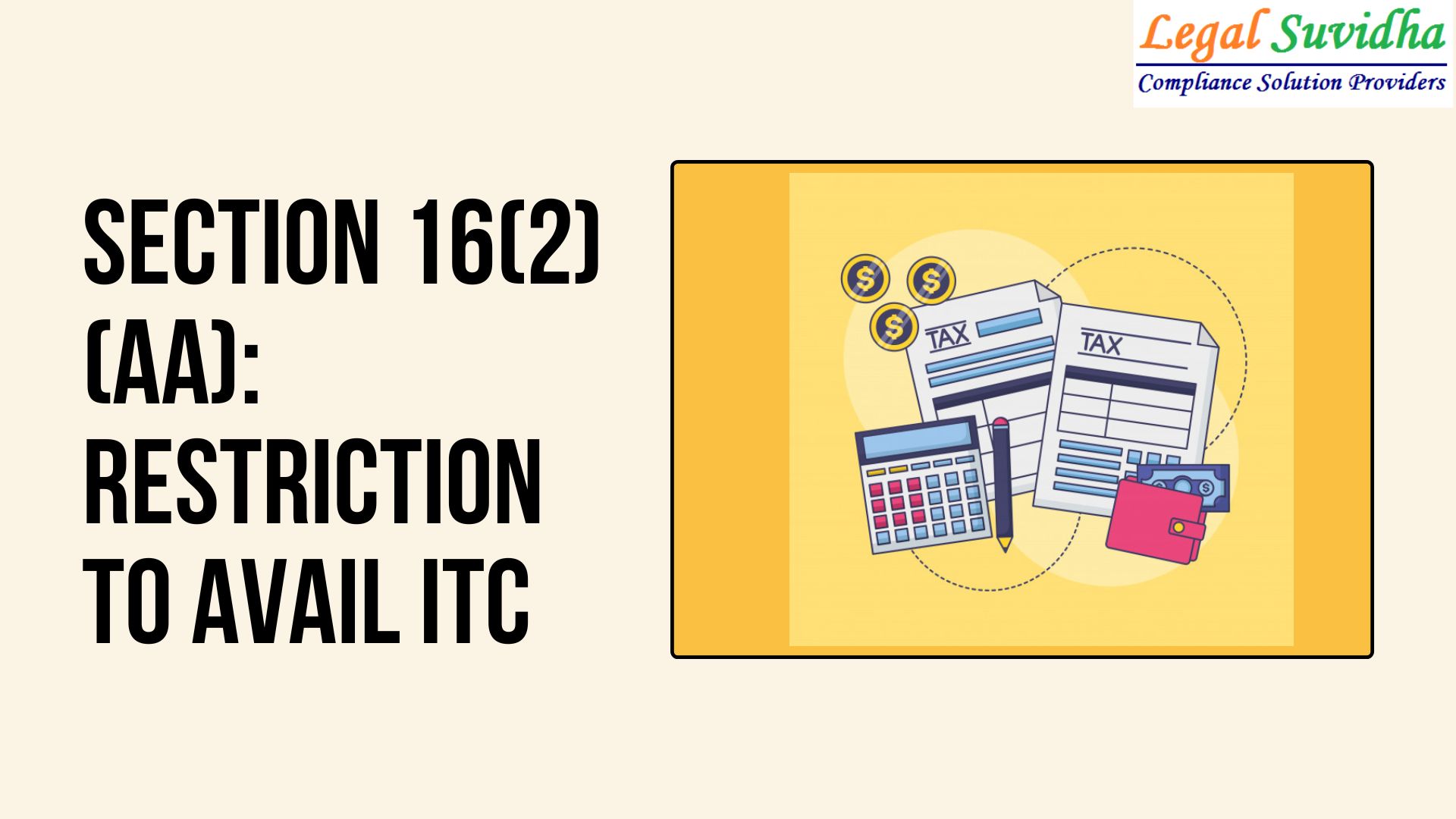SECTION 16(2) (aa)-RESTRICTION TO AVAIL ITC UNDER CGST
Section 16 of The Central Goods and Services Tax, Act, 2017 (“CGST Act, 2017”) provides that subject to such conditions and restrictions as may be prescribed and, in the manner, specified in section 49, be entitled to take credit of input tax charged on any supply of goods or services or both to him which are used or intended to be used in the course or furtherance of his business and the said amount shall be credited to the electronic credit ledger of such person.
Input Tax Credit (ITC) forms the backbone of GST. It is imperative to streamline seamless flow of credit and any impending issues under ITC must be resolved at the earliest for making GST a Good and Simple Tax. Entire GST law is based upon seamless ITC but in practice it is totally diverse scenario. Any action of denying ITC would lead to cascading effect and kills the soul of GST. Though, availing of ITC forms one of the most critical activity for every business to settle its tax liability, however, claiming ITC is a mammoth task.
What is Input Tax Credit in GST?
Manufacturer, E-commerce operator, supplier, agent, and any other legal entity who is involved in the input credit mechanism, will eligible for claiming input credit for the tax paid by the payer on a purchase. in simple terms input credit in GST means the tax payer can claim for Input Tax Credit for the amount they paid at the time of purchase.
ITC rules under GST
- Suppliers can only claim for the input credit based on last lot, in case of inputs are received in lots.
- Suppliers need to provide documents related to the bill of entry or any similar documents for availing Input Tax Credit.
- Must pay the supplier the value of the products or services, plus tax, within 3 months of the invoice’s date of issue, or the sum would be forfeited. The amount of credit available to the recipient would be added to it.
Conditions for availing ITC:
Section 16(2) of CGST Act, 2017 provides that no registered person shall be entitled to input tax credit in respect of any supply of goods or services or both to him unless,–
- he is in possession of a tax invoice or debit note issued by a supplier registered under this Act, or such other taxpaying documents as may be prescribed;
- he has received the goods or services or both;
- the tax charged in respect of such supply has been actually paid to the Government, either in cash or through utilisation of ITC admissible in respect of the said supply.
- he has furnished the return.
The CBIC vide Notification No. 39/2021–Central Tax dated December 21, 2021 notified the below mentioned amendments made vide Section 109 of the Finance Act, 2021 w.e.f. January 01, 2022:
It is pertinent to mention that the aforesaid is one more condition regarding entitlement of ITC. It provides an additional condition to claim ITC based on GSTR-2A and newly introduced GSTR-2B, i.e., ITC on invoice or debit note can be availed only when the details of such invoice or debit note have been furnished by the supplier in the statement of outward supplies (FORM GSTR-1) as specified in Section 37 of the CGST Act, 2017 and such details have been communicated to the recipient of such invoice or debit note.
Hence, w.e.f. January 01,2022, following 5 (five) conditions need to be satisfied under Section 16(2) of the CGST Act, 2017 for availing GST ITC on inward supplies of goods or services or both:
- The recipient is in possession of tax invoice or debit note issued by supplier;
- The details of above-mentioned invoice or debit note have been furnished by the supplier in the statement of outward supplies and such details have been communicated to the recipient in the manner specified under section 37 of the CGST Act, 2017;
- The recipient has received goods or services or both;
- The tax charge in respect of such supply has been actually paid to the Government; and
- The recipient has furnished the return under section 39 of the CGST Act, 2017.
Rule 36(4): No relevance of restriction mentioned in Rule 36(4) of the CGST Act, 2017
W.e.f. 01st January, 2022 there is no relevance of restriction on availment of ITC under Rule 36(4).







